Menu
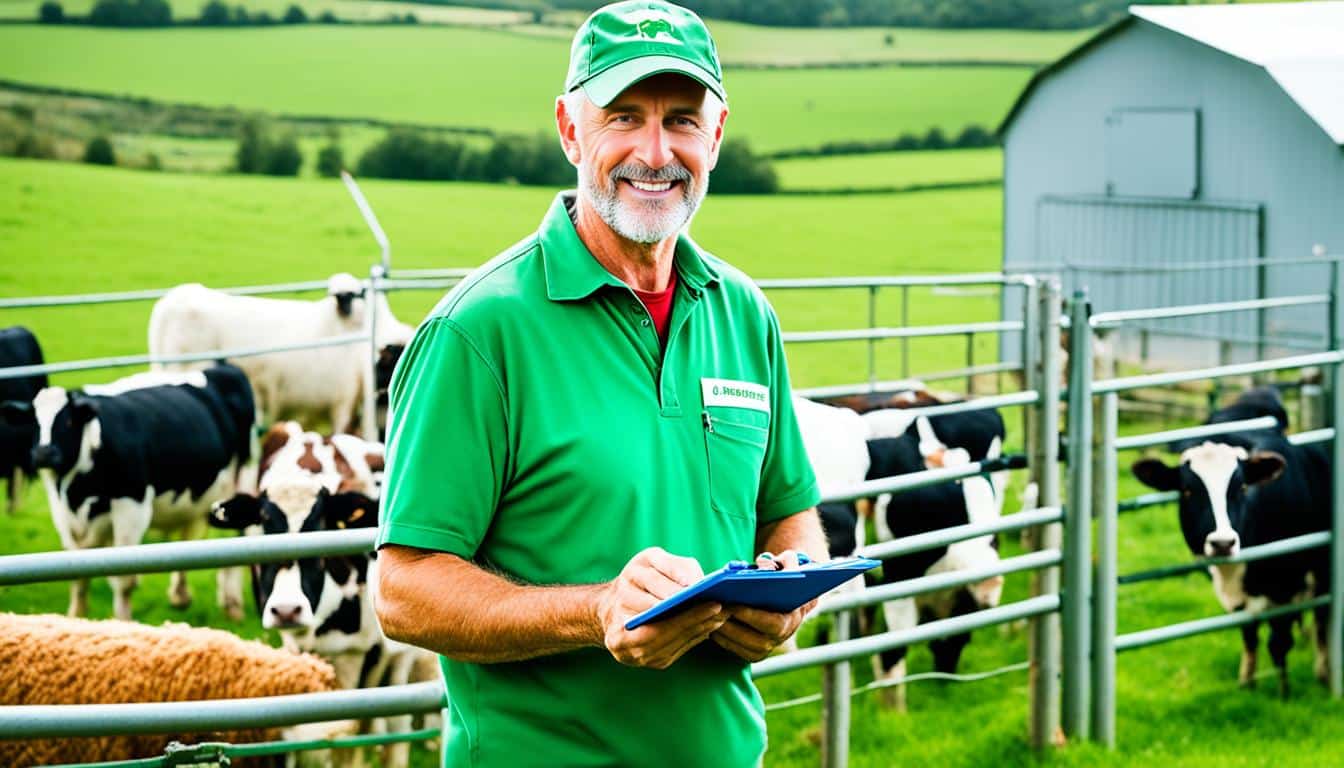
Do you know that over 95% of pigs in intensive farms have their tails docked? This is to stop tail biting. It shows the big issues we face in making sure farm animals are well cared for. Managing farm animal welfare aims to treat animals well and use practices that last. These efforts are based on doing what’s right, knowing animals can feel, and taking care of them in a thoughtful way.
Looking after farm animals goes beyond following rules. It asks the farming industry to think first about the animals. The focus is on caring for animals so they are not just physically healthy but also happy.
How we treat animals affects our world and health. Taking care of animals in a smart way helps everyone. Caring for animals means taking good care of the land and people too.
Farm animal welfare management ensures that animals are well treated on farms. It focuses on keeping high standards for their care. These standards keep up with what’s both right and allowed by laws. It’s key to remember that farm animals can feel and should have a good life, including their feelings and health.
In some farms, animals may have parts of their bodies cut off to stop certain problems. For example, pigs’ tails might be cut off and hens’ beaks could be trimmed. But these actions can really hurt the animals and make them very upset.
Some farm animals are kept alone in very small spaces. This can make them act strangely, like biting on bars, walking back and forth, and even being mean. Bad lighting can also make pigs and chickens feel bad.
If there are too many animals in one place, they can get sick and hurt each other. Not being able to eat or drink enough is a big problem in some farms. This can happen to chickens bred for their meat, as well as to animals who get hurt by others.
“Dairy calves are often separated from their mothers early in intensive farming systems, resulting in adverse effects on their behavior, stress reactivity, and productivity.”
On some farms, there is nothing for the animals to do that they would naturally do. For example, pigs need to search for food with their noses. If they can’t, they might start fights with each other and act very anxious.
Keeping farm animals well in busy farms is a big job. But it’s really important for their health and happiness. It’s all about making sure they have the best life they can.
A new law in California says that mother pigs must have more space, at least 24 square feet. Places that sell pork must follow this by July 1, 2023. This is a big move to make animals’ lives better through proper care.
Laws like this show how vital it is to take good care of farm animals. By focusing on their well-being, we improve not just their health but also their mental state. Following these guidelines is essential for the welfare of all farm animals.
Being sustainable with how we look after animals is key. It helps tackle problems linked to traditional farming. By caring better for animals, we also help the environment and people stay healthier.
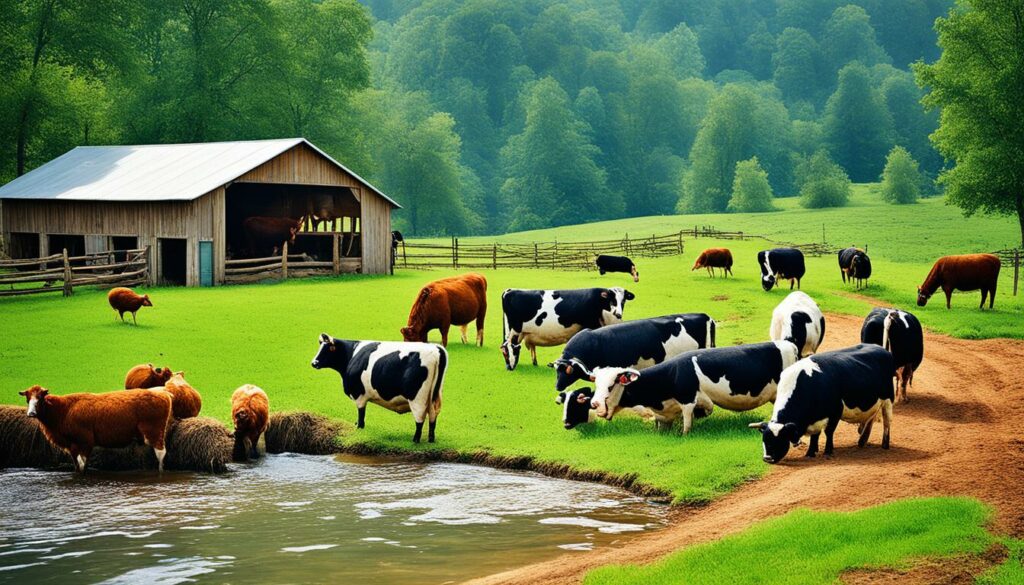
Livestock farming has a huge impact on the world. It’s a big part of why our planet is facing issues like high emissions and water use. By improving how we treat animals, we can farm in ways that do less harm. This means less stress on the planet and its resources.
In a series of meetings across several countries, we learned something important. Treating animals well doesn’t just make them happier. It also can make our dairy and meat better, cut down on losses, and strengthen our brands. These changes help us care for the Earth for the long haul.
Better lives for animals mean healthier food for us. This approach cuts the risk of diseases and antimicrobial resistance. It’s especially crucial in places like India, where helping communities live better, and keeping diseases at bay, is a top concern.
Focusing on animal welfare also means looking out for people. Safer working conditions and healthier animal products are big wins. It saves money on healthcare and keeps workers from getting sick. This shows how animal and human health go hand in hand when it comes to farming.
“Improved animal welfare delivers broader societal benefits, from enhancing public perception to bolstering community health, which are especially significant in regions with high poverty rates.”—Livestock Industry Expert
Some places put more stress on the animals’ wellbeing, like India. Others, like China, think more about money and health for the people. This difference shows that looking after animals can help us all live better and protect the environment.
| Country | Primary Focus | Secondary Focus |
|---|---|---|
| China | Food Safety | Financial Benefits |
| Vietnam | Food Safety | Economic Gains |
| India | Human Health Benefits | Animal Welfare |
| Bangladesh | Community Livelihood | Human Health Benefits |
My work in ethical farming aims to boost livestock welfare by sticking to key principles. This includes offering enough space and enabling animals to have healthy social lives. The idea is to create environments that are good for the animals. This means not going with the old way of squeezing animals in tight spaces to make money. Instead, we believe in treating animals kindly and with respect, as they deserve.
One big part of ethical farming is understanding that animals feel things too. Research, like the European Commission’s “European Union Strategy for the Protection and Welfare of Animals 2012-2015,” shows that we’re getting better at taking care of animals. Make sure they have space and chances to act natural is key. This is what we mean by humane farming practices.
“Farmers’ attitudes toward animal welfare can greatly influence their willingness to adopt humane practices,” noted Heise and Theuvsen in their 2018 analysis of German dairy farmers. This sentiment is echoed by Hansson and Lagerkvist’s 2016 study, emphasising the use and non-use values in animal welfare amongst dairy farmers.
Studies like the one done by Heise and von Hardenberg in 2018 on German pig farmers, and Vaärikkala’s look into Finnish cattle and pig farming, show that people prefer kinder farming. They go for ways that improve animal welfare.
What does ethical farming include?
| Key Factors | Study Insight |
|---|---|
| Farmer Willingness | Peden et al. (2018) investigated factors influencing farmers’ willingness to reduce aggression between pigs. |
| Participation in Programs | Heise and Theuvsen (2018) analysed German dairy farmers’ willingness to participate in animal welfare programs. |
| Attitudes towards Pain | Becker et al. (2014) explored the views of cattle veterinarians and farmers regarding the treatment of sole ulcers. |
| Consumer Concerns | 80% of US consumers expressed concern about the treatment of factory-farmed pigs, with a significant demand for higher welfare standards. |
| Legislation & Policies | The Animal Welfare Institute (AWI) in Washington DC advocates for improved animal welfare policies and practices. |
Ultimately, ethical farming is crucial for real livestock welfare. Humane farming practices help ensure a future where animals’ well-being comes first in farming.
Ensuring farm animals’ welfare involves many best practices. Good housing, proper nutrition, and water are key. So is keeping an eye on their health.
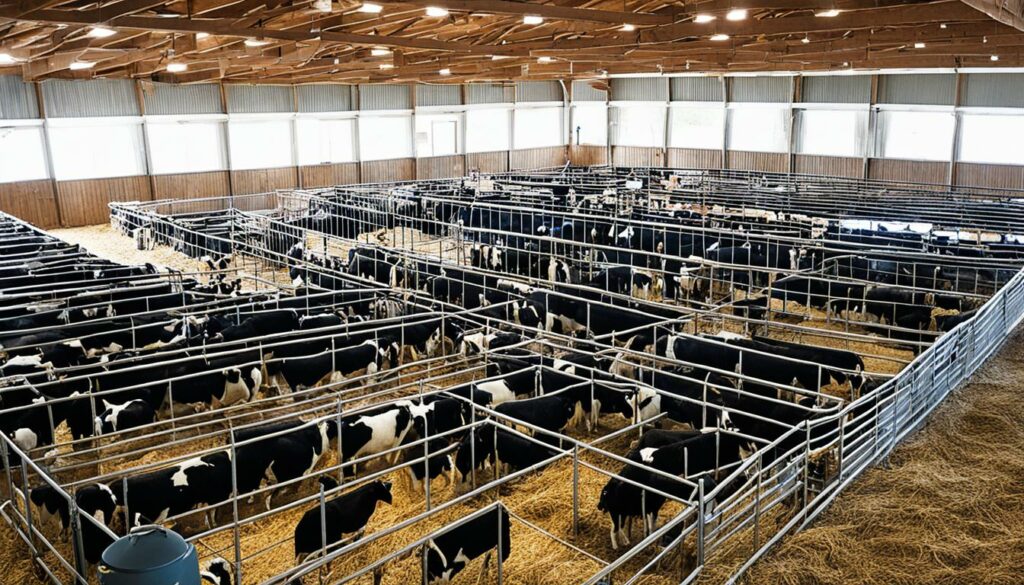
Good housing matters a lot for animal welfare. Overcrowding and a lack of social space can make animals sick. They may get respiratory issues or weak legs. So, it’s important to give them the right amount of room to move and be with others. This can really improve their lives.
Animals need the right food and enough water to stay healthy. Without proper nutrition, they could get sick and not produce as expected. A balanced diet and unlimited fresh water are vital to their care. These help them grow as nature intended.
Looking out for farm animals’ health is key. Spotting and treating diseases early keeps them well. This is especially important in intense farming situations. Health checks can show if animals need a better home or if they’re in pain.
Using these practices can make a big difference in farm animal wellbeing. They also support ethical and sustainable farming. By caring for their homes, what they eat, and their health, we make sure they lead better lives.
Choosing higher welfare foods supports farms that care about animal well-being. This helps in reducing animal suffering. It also encourages eco-friendly farming and tells customers what they’re really buying.
Buying at local markets connects you with high-quality, animal-friendly foods. You can talk to the farmers themselves about how they look after their animals. This way, you support smaller farms that value the welfare of their livestock.
Farmers markets are places where you often find these kinds of farms. They choose ethical, animal-first farming over just making money. So, you know the food you buy is good for animals and the planet.
When you shop, look for certain logos and labels. These show that the food comes from farms that treat their animals well. Here are some important symbols and what they mean:
| Certification | Criteria |
|---|---|
| Certified Animal Welfare Approved by AGW | Supports farmers with high welfare standards, ensuring humane treatment. |
| Certified Grassfed by AGW | Requires animals to be on pasture and fed 100% grass and forage. |
| Global Animal Partnership Steps 4, 5, and 5+ | Ensures pasture access and other stringent welfare standards. |
| Regenerative Organic Certified | Sets animal welfare standards beyond USDA Organic, focusing on holistic farm health. |
| AGA Certified Grassfed | Ensures a forage-based diet without grain. |
| Certified Humane | Provides rigorous animal welfare practices, including indoor environmental enrichment. |
| Real Organic Project | Third-party verification of genuine animal welfare standards. |
Learning about these certifications helps you make good food choices. Knowing what to look for ensures the food you buy is both ethical and sustainable. This is good for the animals and for people too.
Watch out for tricky labels like “Plant Based”. Always check the ingredients to be sure. Websites like Find Humane and the Cornucopia Institute’s guides can point you in the right direction. They’ll help you find products that meet high animal welfare standards.
It’s vital to avoid foods from animals treated badly as part of farm animal welfare management and responsible consumption. Intensive farming, such as CAFOs, leads to terrible outcomes for these animals. In the U.S, about 9 billion land animals are used for food yearly, with most not raised on pastures. This often means animals suffer a great deal.
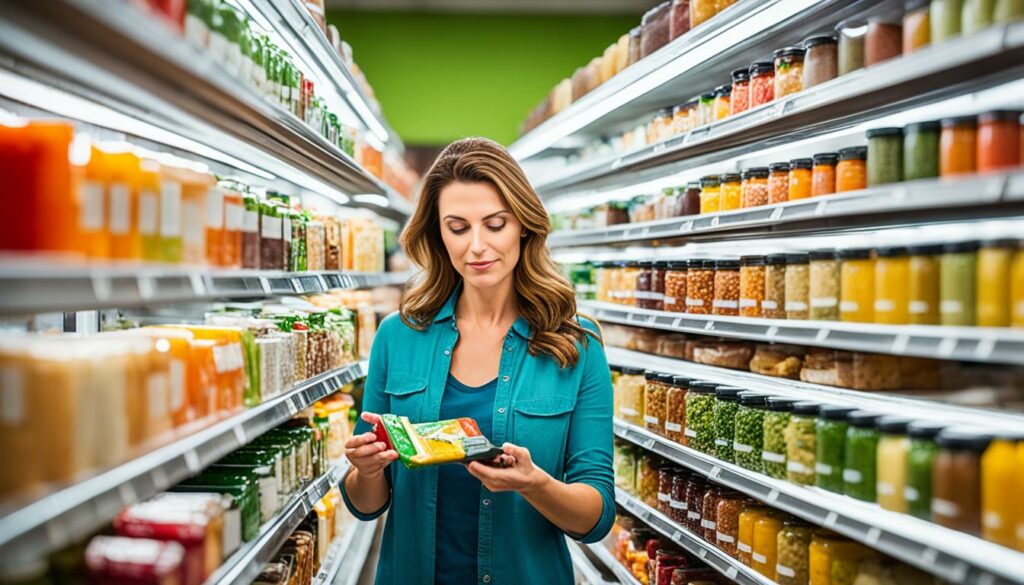
Some practices, like force-feeding ducks for foie gras and confining calves for milk-fed veal, are well-known. Foods like frog legs, shark fin soup, live sashimi, and foie gras should be avoided. Avoiding these foods is important, as millions of sharks die yearly just for their fins.
On average, a meat-eater in the U.S. will consume 2,500 farm animals in their life. This high consumption shows why we must avoid inhumane treatment foods. It’s good for us too, reducing the risk of illnesses like cancer and heart disease.
Animals in CAFOs face horrible conditions, from battery cages for hens to tiny stalls for sows. These practices cause stress and health problems, showing the need for better farm animal welfare management.
This issue is not just about animals. It harms the environment, farm workers, and local communities. Factory farms pollute, but local protests have helped stop their growth. Making wise choices and speaking out can help create a better food system for everyone.
Enhancing housing conditions for farm animals is crucial for improving their welfare. By using social housing systems and providing enough space and comfort, their quality of life improves.
Pigs and chickens are social by nature. They need the chance to interact and build social orders. Practices like tail docking and beak trimming result from not meeting these needs. Social housing can reduce the need for these harsh procedures. It lets animals interact healthily.
Space is vital for animals’ health, both physical and mental. Crowded conditions lead to problems like disease and aggression. Giving them enough room for natural acts is key.
| Factor | Impact on Welfare | Solution |
|---|---|---|
| Overcrowding | Respiratory diseases, leg weakness, aggression | Increase space per animal, reduce stocking densities |
| Individual Housing | Stressed behaviour like pacing, biting bars | Implement group housing to support social interactions |
| Barren Environments | Increased aggression, restlessness | Enrich environments with stimuli to allow natural behaviors |
| Food and Water Restrictions | Deficiencies in learning, aggression, health issues | Ensure unrestricted access to food and water according to animal needs |
Designs that put animal comfort first aim to mimic natural settings. With such improvements, we honour our duty to look after farm animals. This raises their welfare by making sure their health, comfort, and dignity are preserved.
Farm animals often undergo cruel procedures like tail docking and castration. These are done without pain relief to stop them from being aggressive. However, such treatments cause harm. I support the use of ethical animal handling. It looks for better ways to manage animals instead of resorting to these painful acts.
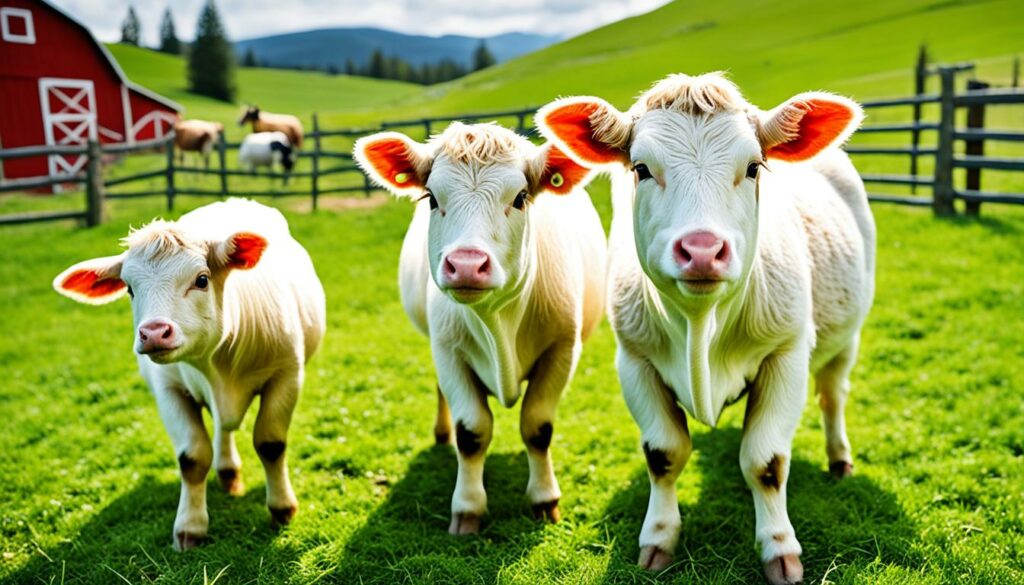
One big idea focuses on changing the farm itself. A better, less stressful farm can help lessen bad behaviour in animals. Take pigs, for instance. They might bite each other’s tails if they’re too crowded. But by giving them more space and friends, this problem can be solved without surgery.
Improving general animal welfare by adding good light and air also helps a lot. It lowers stress and bad habits in animals. And it’s very important for their health. This means less reasons to do things like docking tails.
Solving issues like light problems and too much crowding is vital. It makes pigs and chickens feel less stressed, which is better for them and those caring for them.
Another good way forward is to move away from keeping animals alone. Living in groups makes them happier and more relaxed. This positive change reduces the urge to resort to cruel actions.
Farm animals, just like humans, need good mental health. This helps them feel happy and well-rounded. To do this, it’s important to keep them mentally and emotionally active. This keeps their minds and hearts healthy.
Giving farm animals things to do is as important as feeding them. They need activities that are natural to them. This keeps them smart and emotionally healthy.
For example, hiding food for them to find or using puzzle toys can make a big difference. Studies across China, Vietnam, and other countries show this boosts their well-being. It’s a simple way to help them.
Farm animals also need the right environment to act naturally. Grouping them correctly and giving them space is key. It helps them make friends and feel less stressed.
Doing this not only improves their health but also the quality of the products they make. Good conditions for animals lead to better chicken or steak. So, it’s good for the animals and the farmers.
More and more farmers are understanding this. They are making welfare a priority. By ensuring their animals are mentally stimulated and happy, they are also helping their farms succeed.
Intensive farming has a big effect on how well animals can live. It often means bad living conditions, stress, and health problems. Crowding is a major issue in these setups. It leads to diseases, weak legs, and fights among the animals.
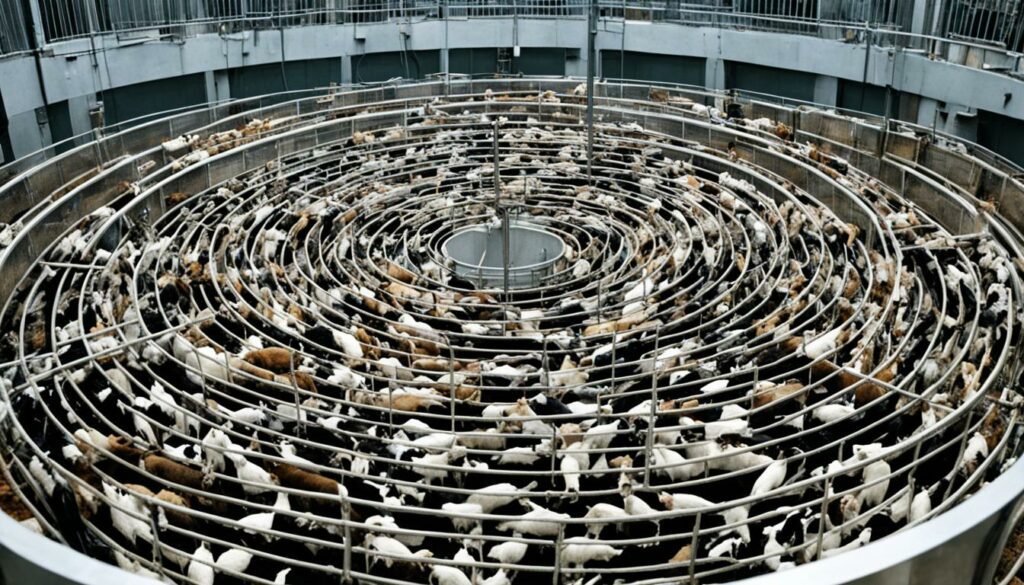
Mutilation like cutting off pig tails and trimming hen beaks is also common. Dairy calves are taken from their mothers right after birth. This causes a lot of stress and hurts the calves’ growth.
Pigs are taken from their mothers very early, at just four weeks old. The use of strange lighting for pigs and chickens is bad for them. Animals not getting enough food and water means they are not healthy. They can’t learn well and might act aggressively due to lack of key nutrients.
Keeping animals alone or in small groups makes them behave strangely and stay aggressive. The lack of things to play with, like root materials for pigs, makes life worse for them.
Mixing and moving around cows, sheep, pigs, and chickens a lot is very stressful for them. It lowers their ability to handle stressful situations. So, there’s a real need for the farming industry to change how it does things.
“In a survey conducted in 2015 across the 28 Member States of the European Union, 94% of EU citizens believed it was important to protect the welfare of farm animals.”
Changing things for the better means the farming industry needs to care more about animal welfare. This requires understanding how bad the current methods are. And then, moving to ways of raising animals that are kinder and more earth-friendly.
| Impact | Causes | Consequences |
|---|---|---|
| Overcrowding | High density of animals in limited spaces | Respiratory diseases, leg weakness, aggression |
| Mutilation Procedures | Common practices like tail docking and beak trimming | Pain, stress, long-term health issues |
| Early Separation | Immediate separation of dairy calves from mothers | Distress, impaired development |
| Inconsistent Lighting | Erratic lighting schedules | Disrupted circadian rhythms, stress |
| Food and Water Restriction | Limited access to essential nutrients | Deficiencies, aggressive behaviour, health issues |
| Environmental Conditions | Barren environments with inadequate materials | Poor mental welfare, stereotypical behaviours |
Keeping livestock safe from diseases and the spread of pests is key. Studies show the vital role of strong biosecurity in farming. It keeps animals healthy and productive.
Stopping diseases from getting onto farms is crucial. A Swiss study praised the value of biosecurity for cattle and pig farms. It highlighted the benefits of strict hygiene, controlled access, and vet check-ups. These measures are key to keeping livestock healthy.
Quarantine of new animals is a vital step. It includes health checks and disease tests. Such actions are critical for avoiding diseases and maintaining high animal care. Across Europe, research confirms that good biosecurity boosts farm success directly.
Controlling pests and parasites is essential for animal care. Studies have shown that clean farms and regular deworming help reduce these issues. In Germany, this led to healthier livestock and less use of drugs.
Early immunisations and careful farm access can prevent disease outbreaks. Using tools like EcoDocs from Folio3 AgTech helps keep track of these efforts. This improves following safety standards and farm cleanliness.
| Study | Focus | Key Insights | t
|---|---|---|
| Kuster et al. (2015) | Biosecurity in cattle and swine farms | Expert opinions on effectiveness and importance | t
| Simon-Grifé et al. (2013) | Spanish pig farms | Critical biosecurity measures as perceived by farmers and veterinarians | t
| Alarcón et al. (2021) | Biosecurity in pig production | Importance of implementing biosecurity in pig farming | t
| Postma et al. (2016) | Farrow-to-finish pig production | Impact of biosecurity measures on production parameters | t
| Raasch et al. (2018) | German farrow-to-finish farms | Association between antimicrobial usage, biosecurity measures, and farm performance | t
In conclusion, top-notch biosecurity is vital for animal well-being. It prevents diseases and controls pests, boosting farm output. These steps improve animal care and ensure a sustainable livestock industry.
Community actions and political advocacy are key in helping animals. It’s crucial to not just make good choices personally, but to work together. This way, we can help make laws and plans that keep farm animals safe. There are clear steps we can all take to make a real difference.
“The greatness of a nation and its moral progress can be judged by the way its animals are treated.” — Mahatma Gandhi
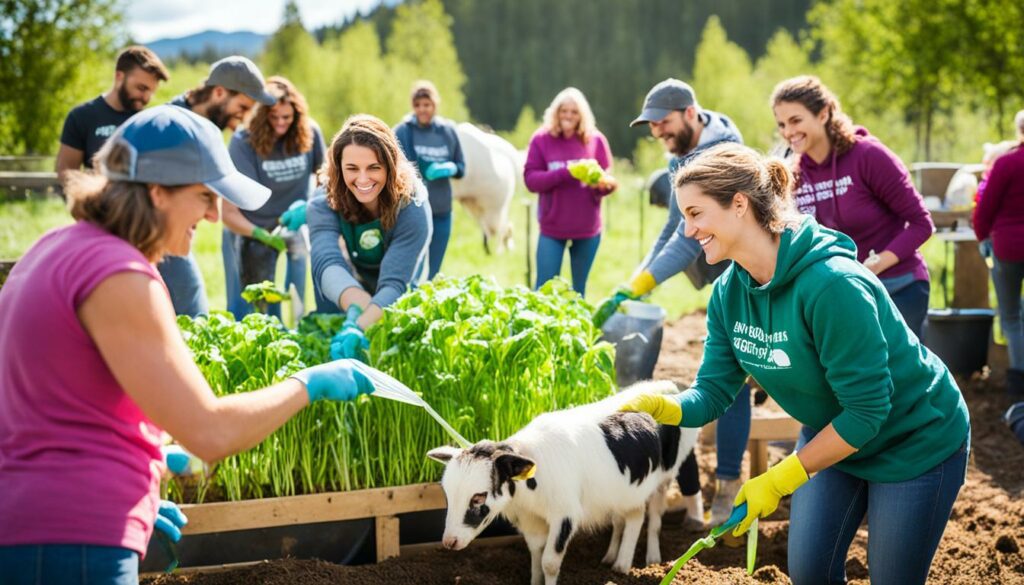
There are many powerful ideas and actions that can help animals, both close to home and around the world:
Local actions can also have a big impact on laws. We can support rules that promote better farming, stricter punishments for those who harm animals, and high standards in farming.
At a global level, the animal welfare fight faces big challenges. One major issue is the lack of worldwide laws. Also, there are not enough experts in this field. Groups like the RSPCA and the WSPA are working hard, but more help is needed.
Making big changes needs everyone’s effort. By turning our focus from just direct help to long-term solutions, we can improve how animal welfare campaigns work.
By working together in our communities and with those who make the laws, we can bring about significant change for animals. Both at the local and policy-making levels, we can ensure a future where animals are treated with care and respect.
This in-depth study shows us how to improve animal welfare in ethical farming. It’s crucial to recognise the link between being kind to animals and farming that lasts. The European Commission’s work from 2012 to 2015, including the Welfare of Animals Strategy, proves that good rules make a big difference.
Studies teach us that what farmers think and do really matters for how well animals are treated. Helping lame sheep quickly doesn’t just make the animals happier. It also helps the farm make more money. This positive change also makes farmers more aware of their animal care.
We need to keep moving forward from what we’ve learned to better care for farm animals. This means using what science tells us works best. It also means tackling big issues like climate change that can harm farms worldwide. Everyone involved, from farmers to lawmakers to us as consumers, plays a key role in making farm life good for animals, money, and the earth.
Managing farm animal welfare means keeping livestock healthy and happy. It covers everything from meeting ethical expectations to following the law. This approach values the lives of farm animals, ensuring they live in ways that support their minds and bodies.
Sustainable animal welfare helps the planet and people. It lessens harm to the environment and cuts down on health risks for humans. By caring well for animals, we can avoid using up too many resources and reduce the dangers of diseases they might spread.
Ethical farming looks after the needs of animals as living beings, not just products. It focuses on giving them space and good social settings. By doing this, it challenges old ways of farming that see animals as things. This kind of farming believes animals deserve to live without suffering.
Good management starts with providing the right home and food to animals. It also means checking on their health often. These steps help ensure animals are happy and don’t get sick or hurt.
To pick foods that come from well-cared-for animals, consumers can look for certain signs when shopping. These signs often show which products are made with care for the animals. They can also talk to the people who grow the food at farmers markets.
Foods that come from cruel practices should be off the menu. This includes items such as foie gras, milk-fed veal, and live sashimi. Choosing not to buy these products helps reduce the suffering of animals.
Making animal homes better means giving them space to be with others and move freely. It’s about designing living areas that let animals act naturally, without stress. Good spaces keep animals physically and mentally healthy.
There are ways to farm that don’t involve painful surgeries. These include creating spaces that stop animals from needing these operations in the first place. By changing how we farm, we can avoid causing animals pain.
Mental health for animals means making sure they’re not bored or lonely. Enriching their world with things that interest them is key. It’s important to give animals tasks that are natural to them, so they don’t just exist but actually live well.
Intensive farming often leads to animals living in bad conditions, which stresses them out and harms their health. Factors like overcrowding and not being able to do natural things are tough on them. We need to farm in ways that care for the animals’ welfare.
To keep animals healthy, it’s important to stop diseases from spreading. This includes following strict cleaning rules and not letting just anyone near the animals. Plus, they need regular checks by a vet and the right vaccinations and deworming to stay well.
Everyone working together can push for laws that make farming kinder to animals. This includes both people in the community and those in charge. By taking action and speaking up together, we can make a big difference for farm animals.